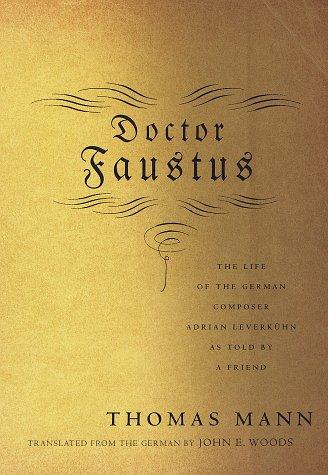534 Seiten
Sprache: English
Am 1997 von A.A. Knopf, Distributed by Random House veröffentlicht.

534 Seiten
Sprache: English
Am 1997 von A.A. Knopf, Distributed by Random House veröffentlicht.
The new translation, by John E. Woods, of one of Thomas Mann's most famous and important novels: his modern reworking of the Faust legend, in which twentieth-century Germany sells its soul to the devil.
Mann's protagonist, Adrian Leverkuhn, is one of the most significant characters in the literature of our era, for it is in him that Mann centers the tragedy of Germany's seduction by evil. This modern Faust is a great artist: Leverkuhn is a musical genius who trades body and soul in a Mephistophelian bargain for twenty-four years of triumph as the world's greatest composer. He is isolated, brilliant, a radical experimenter who both plays and thinks at the very edges of artistic possibility.
The story of his life becomes an apocalyptic narrative of his country's moral collapse as it surges into the catastrophe of World War II. No simple symbolic figure, Leverkuhn is himself, almost …
The new translation, by John E. Woods, of one of Thomas Mann's most famous and important novels: his modern reworking of the Faust legend, in which twentieth-century Germany sells its soul to the devil.
Mann's protagonist, Adrian Leverkuhn, is one of the most significant characters in the literature of our era, for it is in him that Mann centers the tragedy of Germany's seduction by evil. This modern Faust is a great artist: Leverkuhn is a musical genius who trades body and soul in a Mephistophelian bargain for twenty-four years of triumph as the world's greatest composer. He is isolated, brilliant, a radical experimenter who both plays and thinks at the very edges of artistic possibility.
The story of his life becomes an apocalyptic narrative of his country's moral collapse as it surges into the catastrophe of World War II. No simple symbolic figure, Leverkuhn is himself, almost paradoxically, a morally driven man in the vortex of an entire culture's self-destruction.
Through the story of Leverkuhn's life and death, Mann not only gave us his most profound writing on the very nature and heart of all art, but also forced his countrymen (the novel was first published fifty years ago, in 1947) to come face-to-face with how they had fallen prey to all that was most lethal in their heritage.
